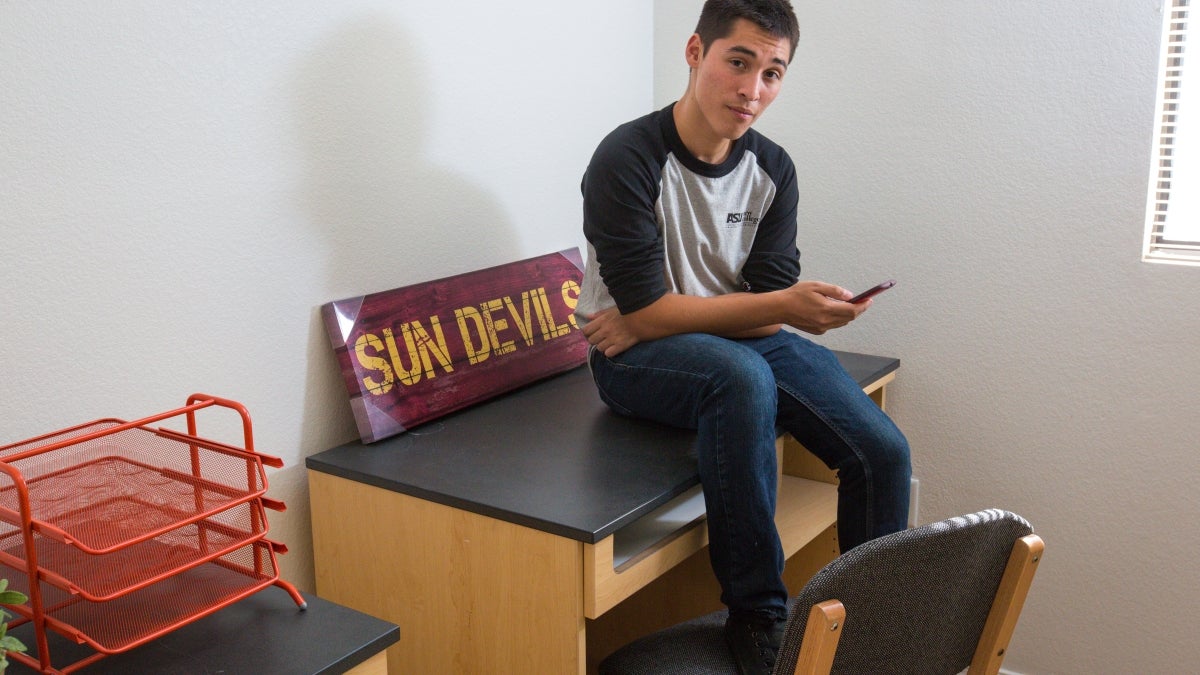His shift ended a while ago, but Victor Seca-Diaz is still hanging around the Sun Devil Fitness Complex on Arizona State University’s West campus.
For Seca-Diazpictured above; photo by Charlie Leight/ASU Now, it’s no big deal to be there when he’s off the clock; he just likes being around people, he says, especially when he’s in a position to offer assistance or guidance. But it took him some time to figure that out.
Though he describes himself as “very studiousHe was accepted to Yale, among other schools. ," as the younger of two brothers in a single-parent household and the first member of his family to attend college, Seca-Diaz initially felt like he was “flying blind” when he began his freshmen year at ASU's West campus in fall 2014.
“The minute my mom left and the door in my dorm shut, I freaked out. I was like, ‘I have no idea what to do. What’s going on? I know absolutely no one here,’” recalled the psychologyThe School of Social and Behavioral Sciences at the New College of Interdisciplinary Arts and Sciences offers a BS and a BA degree in psychology. sophomore.
Fellow psychology major and first-generation student, freshman David Rodriguez, had similar worries. Also from a single-parent household, going to the West campus allowed him to stay close to his family in order to continue helping out at home — but it also meant a lot more work than he was used to.
“The step from high school to university was extremely overwhelming. I was emotionally distressed and was struggling to get four hours of sleep per night due to my work schedule,” Rodriguez said.
Both students attribute the smaller, liberal arts college-feel of the West campus to helping them feel more at ease during their first year of college.
“At West campus in particular, I really found a lot of help within my dean of students’ office,” Seca-Diaz said. “You always see [people from the office] around campus, they are always actively engaged with the students. Being a smaller campus, they know everyone by first name.”
Later on, he discovered TRIO Student Support Services STEMSTEM stands for science, technology, engineering and mathematics. (TRIO SSS STEM), a federally funded program that provides targeted services and assistance to first-generation students, low-income students and students with documented disabilities who are majoring in STEM fields at the West campus.
“Without [the TRIO SSS STEM program], I probably would have been completely lost,” Seca-Diaz said.
“Stop. Breathe. It’ll be alright... College is a marathon, not a sprint.” - ASU West campus psychology sophomore Victor Seca-Diaz, to fellow first-generation college students.
Forensic science freshman Edward Chappell also sings the program’s praises.
“It’s really helping me become more organized and helping my time management,” said the first-generation student from Hagerstown, Maryland.
Chappell had also participated in Upward Bound during his college application process.
And though Rodriguez did not participate in any such programs, he found that he was able to work things out on his own.
“After a few weeks, I had established a routine and now I’m able to function somewhat normally during the day. However," he said. "I still find my schoolwork to be challenging as I am a BarrettBarrett, the Honors College at Arizona State University is a selective, residential college that recruits academically outstanding undergraduates across the nation. student.”
His advice to other first-gen college students is simple: “Find a routine that fits your daily life, and make sure you make time for relaxing as it keeps you sane.”
For Seca-Diaz, reflecting on his positive experiences after an uncertain start inspired him to pay it forward; so he became a student orientation leader, a New College peer mentor and also became involved in West campus’ Residence Hall Association, where he currently presides as the director of public relations.
He too has some advice for first-gen students.
“Stop. Breathe. It’ll be alright,” he said. “You don’t have to do everything in one day. College is a marathon, not a sprint.”
More Science and technology

Indigenous geneticists build unprecedented research community at ASU
When Krystal Tsosie (Diné) was an undergraduate at Arizona State University, there were no Indigenous faculty she could look to in any science department. In 2022, after getting her PhD in genomics…

Pioneering professor of cultural evolution pens essays for leading academic journals
When Robert Boyd wrote his 1985 book “Culture and the Evolutionary Process,” cultural evolution was not considered a true scientific topic. But over the past half-century, human culture and cultural…

Lucy's lasting legacy: Donald Johanson reflects on the discovery of a lifetime
Fifty years ago, in the dusty hills of Hadar, Ethiopia, a young paleoanthropologist, Donald Johanson, discovered what would become one of the most famous fossil skeletons of our lifetime — the 3.2…
